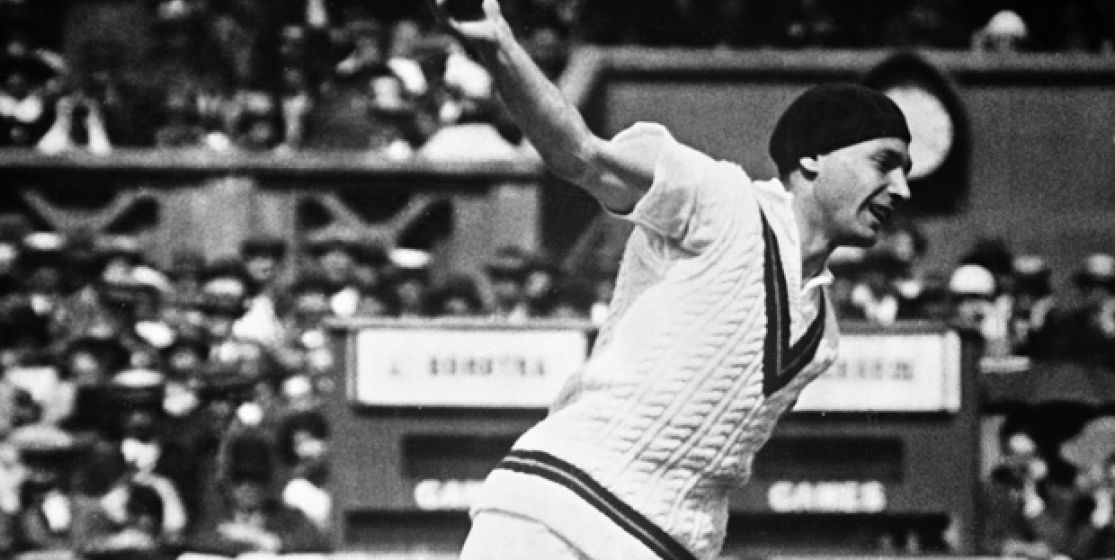This week, France is facing Great-Britain in the BNP Paribas Davis Cup. Enough to recall some pretty bad memories for those who have a good memory. As in 1933, after having lifted the silver salad-bowl six times in a row, the mythical gang of the Four Musketeers was ended after a heroic final against the British. A final blow, as France would have to wait more than half a century to win another Davis Cup.
Roland-Garros ended a month and a half ago, but in this end of July 1933, the courts of the Porte d’Auteuil opened up again for a pretty special occasion, the Davis Cup final. A sort of routine during six years, as France has been lifting the trophy every year since 1927, and the final is being played at Roland-Garros every single year. It’s the era of the irresistible Musketeers, and even if René Lacoste has retires in 1929, Jean Borotra, Henri Cochet and Jacques Brugnon have kept the tradition going by lifting a couple of Grand Slam titles, and remaining undefeated in the Davis Cup. But this 1933 final against the British sounded a little more complicated, and a few signs should have alerted the French on why they should have feared their opponents. First, there was this Roland-Garros final, lost by Henri Cochet, the title-holder and quadruple winner of the tournament, against the Australian Jack Crawford. A bad omen, as all the previous editions of Roland-Garros had been won by French players, except the very first one, in 1891. And there was also a big change in the team : André Merlin, 22, who had a very slim personal record, was chosen over Borotra to play the singles, as the latter was only picked for the doubles.
A complicated start
On the other side, the english team arrived with the same players who played the 1931 Davis Cup final, lost against the Musketeers. Fred Perry was leading the pack with Henry Austin and Patrick Hughes, who was chosen to play the doubles with Harry Lee. On paper, the French remained the better team, especially as they played at home. The English players had just been getting disappointing results at the 1933 French Internationals, as Fred Perry and Patrick Hughes were knocked out early in the tournament, while Harry Lee was defeated by Henri Cochet in the semi-finals. Finally, France had a huge advantage : physical fitness. At the time, the title-holder was directly qualified for the next final, and didn’t have to play all the previous rounds. However, on July, 28th, 1933, when the rookie André Merlin showed up to face Henry Austin, a 27 year old veteran who was used to playing big matches since his younger years, and who was nicknamed « Bunny » everywhere he went, nothing happened as planned. Austin didn’t care about making a good first impression, and crushed his host and opponent in three small sets, 6-3/6-4/6-0. It was now Henri Cochet’s mission, as a player who was ten years older than Merlin and who had won the last six editions of the Davis Cup with the Musketeers, to retaliate. Except that his match also turned sour, as the recent Roland-Garros finalist also walked off the court with a defeat, after a long five-set battle against Fred Perry.
Changeover
Thankfully, to regain hope, France could count on the doubles. And the two players chosen to go to war were the old veterans, who were used to playing some tensed BNP Paribas Davis Cup matches, Borotra and Brugnon, both « Musketeers » since the first day, in the middle of the 1920’s. Borotra, « The Jumping Basque », was older and now 35, but was still jumping around, and the French pair defeated their english opponents in three sets. A first good news for the hosts, before a second one, as Cochet defeated « Bunny » Austin after a hard fought five-set battle. At 2-2, France’s fate was in the hands of the inexperienced André Merlin, who had to play the decisive match against the powerful Fred Perry on July 30th. And against an opponent who had won more than ten tournaments, Merlin and his meagre personal record didn’t really stand a chance. If the French managed to win the first set, he then lost the following three sets. The Musketeers went down on bended knee, and would never come back up. The changeover had been completed, and the English then won the following three editions of the BNP Paribas Davis Cup. Even worse, since that day, no Musketeer would go on to win a Grand Slam tournament, and the silver salad-bowl trophy didn’t come back to France before…1991. Which made Jean Borotra, who was sitting in the stands of the Palais des Sports of Gerland, in Lyon, when France defeated the USA, say : « I didn’t think I’d have to wait this long. » He was then 93 years old.






